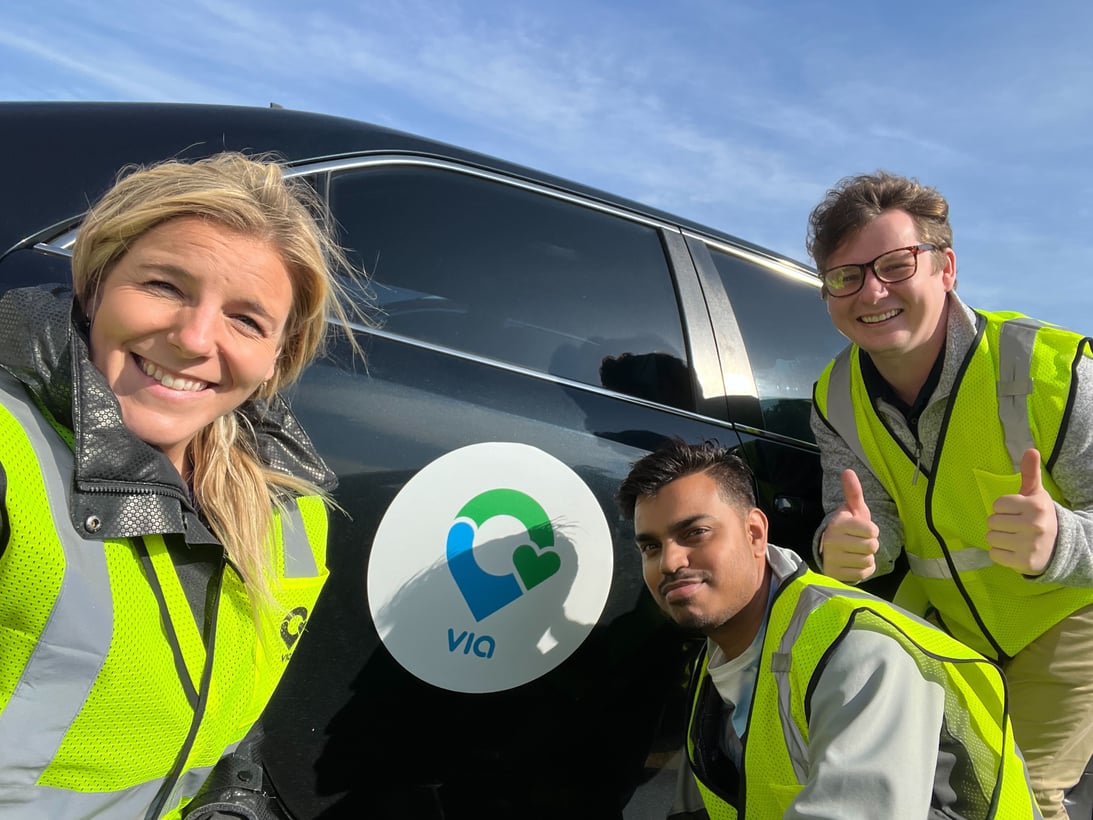Launching safe, efficient new transportation services quickly is how we built our business. During the past decade we’ve brought our technology and operational expertise to get wheels on the ground in hundreds of communities around the world, serving riders with a range of needs - students among them.
If you need to bring on a new vendor for student transportation, we’ve got you covered in five weeks or less. And once we’ve launched, and have a pool of vetted drivers at the ready, we can turn on a dime to scale resources to meet your needs as student circumstances evolve over the course of the school year.
Where do we start?
At a project kickoff meeting between Via and our new school district partner, our launch team will work with school leadership to finalize the details of your service.
- We’ll first align on the number and characteristics of the initial set of routes, as well as processes and timelines for accommodating route changes.
- Then we’ll make sure our team is aware of bell times for the various schools being served, the Individual Education Plan (IEP) characteristics for the students to be transported, and communication preferences for district and school personnel.
- Finally, we’ll align on a strategy for caregiver communication and engagement. We’ll customize a plan to solicit input from parents and caregivers on their communication needs and preferences, and educate them on using Via’s technology — the highly-intuitive Caregiver App — to receive updates on their child’s location and status.
Driver recruitment and safety standards.
During weeks two, three, and four, it’s all hands on deck to prepare for on-the-ground operations.
- Via’s launch team, in coordination with centralized experts on driver recruitment, will tailor job postings and outreach strategies to develop a strong pipeline of qualified drivers.
- If we’re already operating in the vicinity of our new school district partner, we’ll tap into our existing pipeline to speed the recruitment (and launch process) by several weeks.
Our team has significant experience setting pay and incentive targets to not only stay competitive in markets where drivers are thin on the ground, but to ensure driver consistency day over day, week over week. For example, drivers who commit to consistent shifts — critical for the comfort and safety of students with special needs — receive a variety of incentives, including direct monetary compensation and priority shift preferences.
We work with our school district partners to refine a set of driver requirements and training programs to ensure that drivers are prepared to provide efficient, conscientious service to students with a variety of needs.
- We typically require caregiving experience, a number of background checks, references, and more.
- We also require that drivers complete safety-oriented training courses in defensive driving, first aid, and working with students with special needs.
- To keep drivers engaged throughout this multi-stage recruitment and training process, we develop a custom communication plan that keeps them aware of their progress and next steps.
Vehicle acquisition and safety inspection.
Our vehicle team can meet any fleet needs our school partners communicate: we can utilize dedicated or non-dedicated vehicles, as well as wheelchair-accessible vehicles (WAVs) and electric vehicles (EVs).
- During weeks two, three, and four — depending on the chosen fleet model — our team will either coordinate with Via’s trusted leasing partners to source dedicated vehicles, or with the driver recruitment team to ensure that the district’s requirements are reflected in the self-owned vehicles that drivers will bring to the service.
- To confirm that vehicles are safe for live service, and ensure continued safety going forward, our vehicle team manages a number of interlocking inspection procedures.
- A certified mechanic will conduct a 19-point inspection of each vehicle — whether dedicated or driver-owned — before it can enter service, and at regular intervals thereafter.
- Before each trip, drivers inspect vehicles using a photo-based checklist, ensuring that any required safety equipment is present and that the vehicle is ready for service.
As a result of these measures, Via maintains a superlative safety record: out of the almost 5 million trips that we have served in 2023, only 0.005% of Via-provided rides have had a substantiated safety-related incident.
Setting up transparent, safe routing and communications.
Safety is paramount for school transportation services — and goes beyond recruiting qualified drivers and conducting ongoing vehicle inspections. While our recruitment and vehicle teams work on building our driver roster and fleet, our product team will configure our vehicle tracking, caregivers and district communication, and route assignment technologies, all of which play a key role in ongoing safety:
- Via’s technology keeps caregivers aware of their students’ trips, in real time. Through the Caregiver App, caregivers receive in-app and SMS notifications that their student’s driver is approaching, can check key driver information (license plate, name, code phrase), and receive confirmation when their student is dropped off.
- Via’s route assignment algorithm prioritizes consistent driver shifts, helping build trust between student and driver over daily rides. The Driver App provides turn-by-turn directions to keep drivers on track even with new or unfamiliar routes — and critically, delivers student-specific instructions for special needs regarding pickups and drop-offs.
- School and district personnel can track rides and see alerts when problems occur, while Via’s operations team can proactively intervene to resolve any issues before they become disruptive. If a driver is off-route, or excessively delayed, our time will know right away and jump in to coordinate a solution.
Testing, tweaking, and training.
By the fourth week of launching new alternative student transportation services, training and testing (both in-house and in the field) is in full swing. The Via team reviews routing, parent communications, and other important elements to ensure the experience aligns with our school partner’s original project goals. The Via team will conduct detailed training workshops and dry runs with drivers and staff members to ensure they’re comfortable and confident using the new technology.
Introducing your new transportation option.
And just like that, it’s launch day! Beyond in-person meetings, Via will provide continuous launch support remotely, using regularly-scheduled calls, video conferences, and webinars. But that’s just the beginning. Post-launch, we’ll provide ongoing support and continue optimizing the service in response to caregiver feedback and real-time data. Via’s community engagement team will be on hand to help with parent communication and outreach as needed. As routes and student needs evolve throughout the school year, we’ll be there to ensure continued success and a positive experience for students, caregivers, and school personnel.
Curious to learn more? Reach out.

Greg Centini leads Via Student Transit's partnerships team. He works closely with school districts across the country to design safe, reliable and cost-effective transportation.

.png?width=71&height=47&name=Sioux%20Falls%20Webinar%20(6).png)


